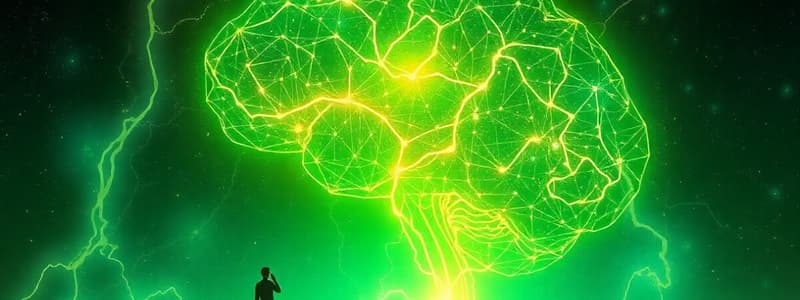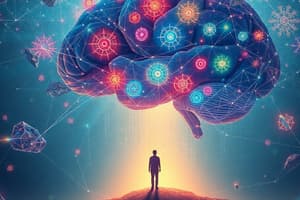Podcast
Questions and Answers
What is the primary function of procedural memory?
What is the primary function of procedural memory?
- Memory for skills and actions (correct)
- Memory for past events
- Memory for facts and concepts
- Memory for emotional responses
Which of the following techniques is most likely to help in transferring information to long-term memory?
Which of the following techniques is most likely to help in transferring information to long-term memory?
- Proactive interference
- Recognition
- Misinformation effect
- Rehearsal (correct)
What does the self-reference effect suggest about memory?
What does the self-reference effect suggest about memory?
- Individuals are more likely to remember information from childhood
- Individuals remember information more effectively when it is related to others
- Individuals have better recall for personally relevant information (correct)
- Individuals forget events that are not personally relevant
What is the primary characteristic of retroactive interference?
What is the primary characteristic of retroactive interference?
Which memory error involves confusing the source of information?
Which memory error involves confusing the source of information?
Which term refers to the involuntary recall of unwanted memories?
Which term refers to the involuntary recall of unwanted memories?
What does semantic encoding involve?
What does semantic encoding involve?
What is the difference between recall and recognition?
What is the difference between recall and recognition?
What does absentmindedness refer to?
What does absentmindedness refer to?
Which type of amnesia involves loss of memory for events following brain trauma?
Which type of amnesia involves loss of memory for events following brain trauma?
What does the Atkinson-Shiffrin model describe?
What does the Atkinson-Shiffrin model describe?
What is the focus of elaborative rehearsal?
What is the focus of elaborative rehearsal?
What type of memory is defined as the conscious effort to recall information?
What type of memory is defined as the conscious effort to recall information?
Which memory type is characterized by exceptionally clear recollection of emotional events?
Which memory type is characterized by exceptionally clear recollection of emotional events?
How does chunking aid in memory retention?
How does chunking aid in memory retention?
What does the equipotentiality hypothesis suggest about memory formation?
What does the equipotentiality hypothesis suggest about memory formation?
Flashcards
Encoding
Encoding
The process of converting sensory information into a form that can be stored in memory.
Implicit Memory
Implicit Memory
A type of memory that involves unconsciously remembering skills and procedures.
Explicit Memory
Explicit Memory
A type of memory that involves consciously remembering facts and events.
Anterograde Amnesia
Anterograde Amnesia
Signup and view all the flashcards
Blocking
Blocking
Signup and view all the flashcards
Chunking
Chunking
Signup and view all the flashcards
Arousal Theory
Arousal Theory
Signup and view all the flashcards
Construction
Construction
Signup and view all the flashcards
Long-Term Memory (LTM)
Long-Term Memory (LTM)
Signup and view all the flashcards
Memory-Enhancing Strategy
Memory-Enhancing Strategy
Signup and view all the flashcards
Misattribution
Misattribution
Signup and view all the flashcards
Misinformation Effect
Misinformation Effect
Signup and view all the flashcards
Mnemonic Devices
Mnemonic Devices
Signup and view all the flashcards
Proactive Interference
Proactive Interference
Signup and view all the flashcards
Procedural Memory
Procedural Memory
Signup and view all the flashcards
Recall
Recall
Signup and view all the flashcards
Study Notes
Memory
- Absentmindedness: Lapses in memory caused by breaks in attention or focus elsewhere.
- Acoustic Encoding: Input of sounds, words, and music.
- Amnesia: Loss of long-term memory due to disease, trauma, or psychological trauma.
- Anterograde Amnesia: Loss of memory for events after brain trauma.
- Arousal Theory: Strong emotions trigger stronger memories; weaker emotions create weaker memories.
- Atkinson-Shiffrin Model: Memory processing through sensory memory, short-term memory, and long-term memory.
- Automatic Processing: Encoding of details like time, space, frequency, and the meaning of words.
- Bias: Feelings and world views distorting memory of past events.
- Blocking: Memory error preventing access to stored information.
- Chunking: Organizing information into manageable units.
- Construction: Formulation of new memories.
- Declarative Memory: Long-term memory of facts and events personally experienced.
- Effortful Processing: Encoding of information requiring effort and attention.
- Elaborative Rehearsal: Considering the meaning of new information and its relation to existing knowledge.
- Encoding: Input of information into the memory system.
- Engram: Physical trace of memory.
- Episodic Memory: Type of declarative memory containing information about personally experienced events (also called autobiographical memory).
- Equipotentiality Hypothesis: Damaged brain areas may be taken over by other parts in memory formation.
- Explicit Memory: Conscious recall and remembering of specific memories.
- False Memory Syndrome: Recall of false autobiographical memories.
- Flashbulb Memory: Vivid, clear recollection of an important event.
- Forgetting: Loss of information from long-term memory.
- Implicit Memory: Memories that are not consciously recalled.
- Levels of Processing: Deeper processing leads to more meaningful and better-stored memories.
- Long-Term Memory (LTM): Continuous storage of information.
- Memory: Processes of encoding, storing, and retrieving information over time.
- Memory-enhancing Strategy: Techniques to move information from short-term to long-term memory.
- Misattribution: Confusing the source of information.
- Misinformation Effect: Mistaking misinformation for original details.
- Mnemonic Device: Aids organizing information for storage.
- Persistence: Involuntary recall of unwanted, often unpleasant, memories.
- Proactive Interference: Old information hindering new information recall.
- Procedural Memory: Long-term memories for doing things (e.g., riding a bike, playing an instrument).
- Recall: Accessing information without cues.
- Recognition: Identifying previously learned information with cues.
- Reconstruction: Bringing up old memories that might be inaccurate due to the influence of new information.
- Rehearsal: Repetition of information for better memorization.
- Relearning: Learning previously learned information again.
- Retrieval: Retrieving information from long-term memory.
- Retroactive Interference: Newly learned information hindering recall of older information.
- Retrograde Amnesia: Loss of memory for events preceding brain trauma.
- Self-Reference Effect: Better memory for information related to oneself.
- Semantic Encoding: Inputting the meanings of words.
- Semantic Memory: Declarative memory about words, concepts, and language-based knowledge.
- Sensory Memory: Brief storage of sensory input (sights, sounds, tastes).
- Short-Term Memory (STM): Temporary storage of information, holds about 7 items.
- Storage: Permanent record of information.
- Suggestibility: Misinformation from external sources leading to false memory creation.
- Transience: Memory fading over time due to lack of use.
- Visual Encoding: Inputting images.
Studying That Suits You
Use AI to generate personalized quizzes and flashcards to suit your learning preferences.



